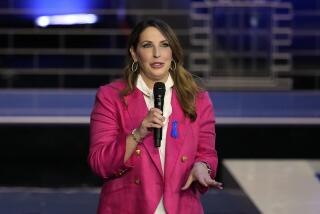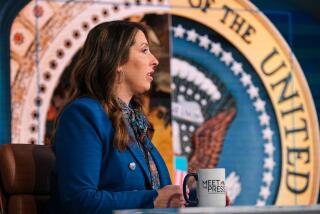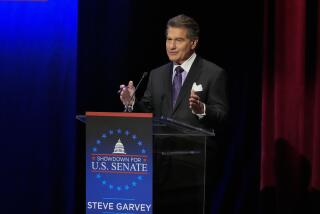On the Media: Not every Republican wants to quiet NPR and PBS
He professes his love for NPR’s foreign coverage and says he detects no pronounced political bias. His favorite episode of the public radio series “This American Life” is the one about youthful misconceptions that finally get clarified. (No, all Nielsen ratings families are not named Nielsen. And quesadilla is not Spanish for “What’s the deal?”)
Funny thing about the public broadcasting fan gushing to me over the phone: This was not some Birkenstock-wearing yippee, but David Dreier, the San Gabriel Valley Republican who is the new chairman of the Rules Committee in the House of Representatives.
It might not be healthy these days for conservatives to admit they like public broadcasting, given the relentless flogging it takes from some ideologues. So give credit to Dreier for acknowledging the truth — that NPR, PBS and their local affiliates are gems that deserve our support, one way or another.
But which way? The question has become urgent again as Congressional Republicans have vowed to eliminate $451 million, the entirety of federal taxpayer support, for the Corporation for Public Broadcasting. They want to immediately “zero-out” the appropriation for the CPB, which supports the TV and radio networks and their affiliates.
Not all Republicans are obsessed with whacking the parent of public radio’s “All Things Considered” and public television’s “Antiques Roadshow.” They recognize that to niggle over that $451 million in a $3.8-trillion budget is like the bank clerk securing rolls of pennies while bank robbers empty the safe.
Indiana Sen. Richard G. Lugar has seen multiple debates on public broadcasting over his three decades in Congress. He sees the CPB dustup for what it is — a sideshow. “It’s a diversion from focusing on the really big issues,” said Lugar’s spokesman Mark Helmke. “He has said we really need to focus on the big issues — the defense budget and entitlements.”
Dreier, despite his cheerleading about what he hears and sees on public TV and radio, said the federal debt has simply grown too large, around $14 trillion, to not make cuts in every corner of the budget.
Dreier believes taxpayers should be taken off the hook, with public broadcasting supported by “listeners-viewers like you,” foundations and corporate donors. “I very much believe there are people who will provide voluntary support,” Dreier said. “I want to find a way to form a post taxpayer-supported Corporation for Public Broadcasting.”
Dreier stresses that the change shouldn’t be made precipitously. Budget hawks want the funding ended now. There are 368 public TV stations and 934 public radio stations. Many in small and rural markets get a huge chunk of their funding from Washington. Without the money, they would almost certainly die.
“There needs to be a transition period,” Dreier said, without specifying exactly what it should be. “There are local affiliates in places like Alaska and North Dakota and places where public broadcasting stations are the only stations out there. We need to figure out another way to do it.”
How about another approach? What if both parties ended the decades-long game of chicken they have played with the budget. Democrats blame Republicans for going small bore against bogeymen like NPR and PBS. Republicans blame Democrats for refusing to cut, at all.
Both sides have failed again this budget season to seriously look at fixing the areas where the bulk of our tax money goes — notably in Medicare, defense and Social Security.
Please, Mr. Lawmaker, please, do something serious — admit we have to reduce Medicare benefits or settle on a reasonable size for our military — rather than fiddling and fussing with the small stuff. Here’s betting Chinese Premier Hu Jintao — his nation is the largest outside holder of U.S. debt — isn’t impressed by our cleanup of rounding errors.
Those who support public broadcasting shouldn’t shrink from admitting that they want and need a taxpayer subsidy. We understand the value of paying to bolster media in budding democracies overseas — good information helps people make the right decisions.
On our own shores, the free market is supposed to provide all the information and education we need. But the market is not perfect; witness the small communities whose “hometown” radio — piped in from a thousand miles away — includes only the merest specks of local news, even during floods and other emergencies.
National Public Radio helped sow the seed for the budget-cutting whirlwind last fall, when it hastily fired commentator Juan Williams after his talk on Fox News about how he got uncomfortable on a plane with people in “Muslim garb.”
NPR’s bosses accused Williams of breaking a rule against expressing personal opinions. Williams and conservatives said he had been the victim of an ideological purity test.
NPR clearly mishandled the situation, its explanation less than adequate because it hadn’t meted out any punishment when other personalities strayed off the no-opinion reservation. The misstep gave license to Williams — a peripheral player on the radio network, at best — to claim a spot as a Free Speech martyr. And that opened the door to others claiming NPR routinely victimized the right.
In fact, a study last fall found NPR tilts slightly left but not nearly as demonstrably as the furious post-Williams lambasting would suggest. Twenty-two percent of listeners identified themselves as conservative and 45% as moderates, compared with 36% conservative and 37% moderate for the population as a whole, according to the Pew Research Center for the People & the Press.
It’s not unusual to find conservative fans of NPR on Capitol Hill, though not all are ready to broadcast their affections. Dreier doesn’t hesitate.
“I am just a big fan of public broadcasting,” he told me, noting that he had helped with pledge drives at KCET television in Los Angeles and also donated to KCRW and KPCC radio in Los Angeles, along with WAMU, the leading public radio station in Washington.
Dreier will soon be traveling to Indonesia as part of a program to help build parliaments in emerging democracies around the world. He can’t wait to visit NPR’s Jakarta bureau, maybe for an interview about his trip.
He didn’t seem to be joking when he concluded: “But what I really want to do is host ‘Morning Edition.’ ”
Twitter: latimesrainey
More to Read
The biggest entertainment stories
Get our big stories about Hollywood, film, television, music, arts, culture and more right in your inbox as soon as they publish.
You may occasionally receive promotional content from the Los Angeles Times.







